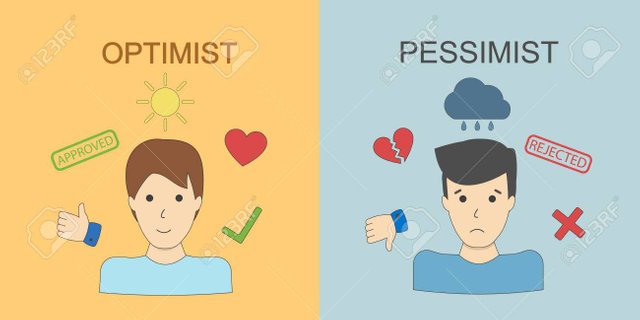Optimist believes for all steemians and foreseen mindset.
Not sure if you are an optimist or a pessimist? Do you want to clearly see the difference between an optimistic person and pessimistic person so you can figure out where the people around you stand? This article will list some of the differences in very real situations and even give examples. At the end of it, you should have a clearer vision of the difference between optimistic and pessimistic, and you should be able to quickly see people, including yourself, for what side of the scale they represent more.
Optimism maximizes potential as pessimism squashes it. Look at these five (5) distinguishing differences between optimists and pessimists...so choose the one you believe is right and correct
1~ Believe They Are In Control
Nothing you did could have changed anything.
And that being angry and blaming yourself for not being able to control the past or the future is only going to hurt worse. If you keep thinking like this, you will only be re-inventing pain.
Heaven would tell you that it’s just a little rain.
And it’s not the rain that kills you,
it’s the pain of wanting to control the sun.
Don’t let people who don’t care about you, manipulate your mind, feelings and emotions or control how you think about yourself. Never give that much power to someone else.
Take notice of what thoughts you fill your mind with each day. Our thoughts draw to us whatever is dominating our mind, so always keep what you are thinking about in check. The worst part about anxiety attacks, is that you’re aware it’s irrational and sometimes unexplainable, but knowing that gives no aid what so ever. In most cases, it deepens the anxiety as you realise “if I know it’s irrational, why can’t I stop it… Oh god I can’t stop it” you begin to believe you are no longer in control of your mind. That. That is fear.

Control your thoughts and everything will be under your control.
Optimists believe they can shape their future. They see no reason why tomorrow can’t be better than today was, and they’re right. Circumstances and prior failures don’t matter as much to an optimist.
An optimist’s worldview is such that life improvement is expected. This loops and strengthens itself over time through positive reinforcement, especially with the right strategies.
But pessimists often feel no sense of control over their lives. If they believed they had control, they wouldn’t be pessimists, because that would mean that they choose negative outcomes. Quite often, pessimists base their gloomy expectations on prior experiences. They fail to understand the concept of 2nd, 3rd, and 33rd chances
2~ Forward-Looking
Looking forward to things is half the pleasure of them. You mayn't get the things themselves; but nothing can prevent you from having the fun of looking forward to them. Forget the past, it's gone, but glance back occasionally to remind yourself where you came from and where you are going.
Always look ahead, but never look back.

Sometimes you have to forget what's gone. Appreciate what still remains. And look foward to what's coming next. I'm really looking forward to, not more of the same, but a continual growth.
You can't connect the dots looking forward; you can only connect them looking backwards. So you have to trust that the dots will somehow connect in your future. You have to trust in something - your gut, destiny, life, karma, whatever. This approach has never let me down, and it has made all the difference in my life.
A man's delight in looking forward to and hoping for some particular satisfaction is a part of the pleasure flowing out of it, enjoyed in advance. But this is afterward deducted, for the more we look forward to anything the less we enjoy it when it comes.
.jpg)
Yesterday is filed away as a joyful or educational experience in the mind of an optimist. There is no day like the present, and hey, tomorrow is looking pretty good too.
Have you thought about this? The present moment is completely neutral. Anything (good or bad) can happen from this moment on. So the optimist sees this neutrality as an opportunity to make something good happen. Another optimist skill is connecting how today’s positive actions almost guarantees a better future.
Pessimists are not forward-looking in general. Yes, they look ahead and see a bleak future, but they often base it on the past, where they like to hang out and drink slurpees. Do you know of any super successful and happy people who see their future as bleak? If so, it’s probably because of some recent news or traumatic event, not their past.
Even if your past was rough, it is possible to have a bright outlook if you believe in yourself (next on the list).
The past can cripple you if you live in it. It can hold you back if you believe you’ve already hit your ceiling. Or it can teach you if you examine it.
If you want to be an optimist, let your past become weightless life lessons. It’s a choice.
3~ Optimists Are Confident In Themselves
Believe in yourself! Have faith in your abilities! Without a humble but reasonable confidence in your own powers you cannot be successful or happy..You gain strength, courage, and confidence by every experience in which you really stop to look fear in the face. You are able to say to yourself, 'I lived through this horror. I can take the next thing that comes along.
Kindness in words creates confidence. Kindness in thinking creates profoundness. Kindness in giving creates love.
.jpg)
Love who you are, embrace who you are. Love yourself. When you love yourself, people can kind of pick up on that: they can see confidence, they can see self-esteem, and naturally, people gravitate towards you.
As long as you keep going, you'll keep getting better. And as you get better, you gain more confidence. That alone is success.
Life is not easy for any of us. But what of that? We must have perseverance and above all confidence in ourselves. We must believe that we are gifted for something and that this thing must be attained.
Sometimes we may ask God for success, and He gives us physical and mental stamina. We might plead for prosperity, and we receive enlarged perspective and increased patience, or we petition for growth and are blessed with the gift of grace. He may bestow upon us conviction and confidence as we strive to achieve worthy goals.
Confidence is a determining factor for optimism and pessimism. Optimists believe they can overcome whatever life throws at them and continue on their way. Pessimists don’t believe this, and so are “victims” of circumstance.
If you lack confidence, you might be a pessimist for the simple reason that you don’t believe you can do it. The best way to fix this problem is to learn the skills you need in order to succeed. Change your definition of success to progress and focus on what you can succeed with now
4~ Optimists See Possibility. Pessimists See Problems.
A pessimist sees the difficulty in every opportunity; an optimist sees the opportunity in every. Success is not final, failure is not fatal: it is the courage to continue that counts.
There is a profound difference between dike and dyke and an even more profound difference between sticking something in one vs. the other.

The positive-minded person says, “What should I do next? There are so many exciting options!”
The negative-minded person says, “What should I do next? I’ve got so many problems to deal with!”
Problems are a part of life. I’ve found it best to ignore the ones you can’t do anything about. A pessimist can see an optimist with the same problems and think, “well, if they had my issues, they wouldn’t be so peppy!” It’s not true. People with all sorts of problems cope with them and still move their lives in a positive direction.
Sometimes the best way to deal with life’s problems is to say, “so what? I’m deciding to move forward
5~ Optimists Have Better, But Shorter Lives
Optimism produces a better life of course… but shorter!? Yes, according to a recent study.....
"findings revealed that being overly optimistic in predicting a better future was associated with a greater risk of disability and death within the following decade"
it isn’t clear which of these people were optimistic or pessimistic – it just measured their expectations to actual life satisfaction years later. The people defined as “overly optimistic” could have been slightly pessimistic and had worse life outcomes than expected. And the people defined as “pessimists” who underestimated life satisfaction could have been slightly optimistic and had their expectations exceeded
A different study found that optimism seems to protect heart health.
.jpg)
According to this research, realistic expectations help us to make smarter choices, and general optimism is very good for the mind and body. To go along with the obvious benefits of an optimistic mindset, it makes sense to be optimistic about your future, but not to let it blind you to life’s turbulence. Neither blind optimism or blind pessimism are good for you